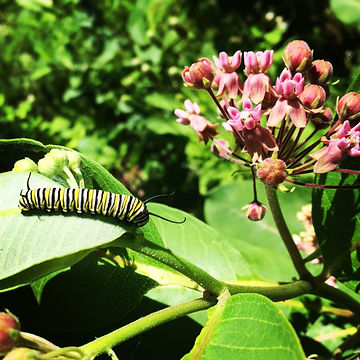The Meduxnekeag Appalachian Hardwood Forests have a unique ecology extending well beyond the trees, flowers and ferns that are found there and not elsewhere in New Brunswick.
In the summer of 2004, a team of entomologists – Reginald Webster, Kate Bredin, and Jim Edsall – spent two weeks in July, August and September at the Meduxnekeag Valley Nature Preserve collecting insects and documenting biodiversity. Their survey found a number of species at Bell Forest, Leonard Woods and Wilson Mountain which had not been recorded in New Brunswick. Some of these were new records for the Maritimes, and one is believed to be a first for Canada.
These new species records include:

Bomolocha madefactalis
This species was recorded from Bell Forest. Butternut and walnut (Juglans spp.) are the only recorded caterpillar host plants for this moth, so its presence at the Bell Forest site was not unexpected, as butternut is relatively abundant there

Catocala neogama
This large striking moth species was recorded from Bell Forest; it has not been previously recorded from the Maritimes.

Bembidion lacunarium
This small beetle was common along a stream margin in Bell Forest. It was not previously listed as occurring in New Brunswick or the Maritimes.

Gaurotes cyanipennis
This bright blue green long-horned beetle was found on flowers at both Bell Forest Preserve and at Wilson Mountain. The larval host plants are various hardwood tree species. This species was not previously known from the Maritimes and represents a new record for New Brunswick

Saperda vestita
This large distinctive species, found at Wilson Mountain, was also not previously known from the Maritimes. The larval host plant is Basswood (Tilia americana), a tree typical of rich hardwood forests.

Oxyporus kiteleyi
This species was collected from Bolete mushrooms at the Meduxnekeag River Valley Nature Preserve. This species was not previously known from the Maritime Provinces (Bousquet 1991)

Oxyporus major
This distinctive species was collected from Bolete mushrooms at Leonard Woods. O major was not reported as occurring in Canada in (Bousquet 1991), and thus this specimen may be the first Canadian record. The closest known localities are in Vermont.

Bolitophagus corticola
Several individuals of this beetle were found on bracket fungi in Bell Forest and at Wilson Mountain. This species was not previously known from the Maritime Provinces.

Schizogenius lineolatus
Two individuals were found among cobbles along the margin of the Meduxnekeag River in the Meduxnekeag Valley Nature Preserve (Wilson Mountain). This species is not listed as occurring in New Brunswick or the Maritimes.

Sanfilippodytes pseudovilis
This little water beetle was found among small stones and gravel near the outflow of a narrow spring-fed brook in Bell Forest. This is the first record of this species for New Brunswick and the Maritimes
The Lepidoptera are probably one of the best known insect groups in New Brunswick in terms of distribution and habitat associations. Several species that are likely closely associated with rich hardwood forests were found during this study. These are Bomolocha deceptalis, Bomolocha madefactalis, and Catocala neogama, which use either Basswood or Butternut as larval host plants. Acronicta spinigera, which was previously known from only one other site in New Brunswick, was quite common at Bell Forest and at the Meduxnekeag Valley Nature Preserve (Wilson Mountain and Leonard Woods)
Less information is available on the distribution and habitat associations of Coleoptera in New Brunswick. Considering that 34 species of Coleoptera new to New Brunswick were recorded only from rich Appalachian hardwood forests during this study, it is likely that many of these may be endemic to this habitat. Because its only known larval host plant is Basswood, Saperda vestita is likely endemic to rich hardwood forests.
Moth and beetle species found in the Meduxnekeag Valley Nature Preserve which were not previously recorded as occurring in New Brunswick include:
Moths
Tiger Moths: Euchaetes egle; Spilosoma latipenvis;
Owlet Moths: Bomolocha deceptalis; Catocala neogama.
Beetles
Brachypteridaefamily: Brachypterus urticae;
Soldier Beetles: Podabrus modestus; Rhagonycha fraxini;
Ground beetles: Agonum palustre; Bembidion lacunarium; Lebia tricolor; Oxypselaphus pusillus; Schizogenius lineolatus;
Longhorn beetles: Cyrtophorus verrucosus; Gaurotes cyanipennis; Saperda vestita; Strangalepta pubera; Trigonarthis proxima;
Minute tree-fungus beetles: Cis pistorius;
Flat bark beetles: Cucujus clavipes; Laemophloeus fasciatus;
Snout beetles: Listronotus maeulicollis;
Predaeceous diving beetles: Sanfilippodytes pseudovilis;
Handsome fungus beetles: Phymaphora pulchella;
Fireflies: Pyractomena linearis;
Small scavenger beetles: Prionocheta opaca;
Net-winged beetles: Platycis sculptilis;
False darkling beetles: Orchesia castanea;
Tumbling flower beetles: Mordellistena limbalis;
Sap beetles: Cryptarcha ampla;
Rove beetles: Aleochara castaneipennis; Lordithon cinctus; Oxyporus kiteleyi; Oxyporus major; Oxyporus stygicus; Scaphisoma convexum; Scaphisoma rubens; Tachinus addendus;
Darkling beetles: Bolitophagus corticola; Mycetochara fraterna;

